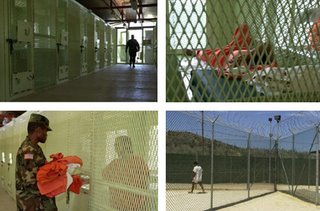Tuesday, September 12, 2006
Detainee Treatment and Tribunals Legislation

The gooper lawmakers are trying their best to help President Bush evade responsibility for having authorized abuses of prisoners in the "war on terror."
The Bush administration has won concessions from key Senate Republicans in proposed legislation on standards for detainee treatment and the rules for military trials of terrorism suspects, although some disagreements persist between the lawmakers and the White House, Senate sources said yesterday.
The disagreements that remain involve whether suspects can be convicted with evidence they are never allowed to see, an approach favored by the administration but opposed by the Republican senators. The two sides also still differ over the terms of a related amendment to the U.S. War Crimes Act that would limit the exposure of CIA officials and other civilian personnel to prosecution for abusive treatment of detainees, the sources said. ...
Lawmakers ... will be considering three bills -- the Senate and House bills plus the administration's own bill -- that contain many provisions the administration has sought. This prospect has raised concerns among human rights groups and defense attorneys who say the plans offer inadequate protections for defendants and would set a precedent for the use of similarly worrisome rules at foreign trials of captured U.S. personnel.
The Senate bill for the first time includes language supporting the administration's position that detainee abuse can be prosecuted only if it, in effect, "shocks the conscience." Legal experts say that instead of setting an absolute standard for conduct, the bill's language would leave room for judges to weigh the urgency of the information extracted from detainees during rough interrogations.
The revised Senate bill also would bar detainees held by the United States from bringing legal action against the government to challenge the legality of their detention or treatment. It would bar the collection of damages by detainees for violations of the Geneva Conventions, which set the minimum standards for wartime treatment. Both provisions were sought by the administration, although their language is not as sweeping as the White House preferred.
The new Senate draft also requires that any evidence used at trial be declassified or summarized, a provision the administration strongly opposes. Under the measures, the military judge presiding over a trial could dismiss charges if the government refuses to turn over evidence to the defendant.
The Senate draft also contains other provisions the administration opposes, including one that would allow the prosecution of U.S. personnel for any degrading treatment of detainees and another that would prohibit the use of evidence obtained through cruel, inhuman or degrading treatment. It further defines those subject to future military trials as people engaged in anti-U.S. hostilities, a narrower definition than the White House prefers.


